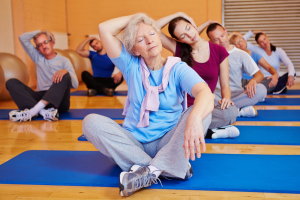If you manage stress and relaxation you will feel a lot better. Physical fitness is important for us, as the previous chapter has explained, but our mind and body are an interrelated, connected unity. Wellbeing due to physical fitness translates into positive emotions. It greatly contributes to feeling well, enjoying an activity, adding zest and vibrancy to our lives. It does not matter how old or how young we are.
Positive attitude
On the other hand there are people, who are unable to enjoy an activity like running, walking or dancing due to a physical handicap, yet very often persons with enormous physical challenges can inspire us with their positive attitudes and their indomitable spirits. Our mindset has profound influences on our body. We all have experienced events that disrupt our comfortable routine, let’s take an examination, which we do not feel comfortable about. In response to such a situation we experience physical symptom of stress: our palms feel clammy, our heart beats like a hammer, and we may notice a slight tremor of our hands.The feelings start with our frame of mind, and they translate into stress. Our brain sends stress signals and in response the adrenal glands release the stress hormone cortisol.
Managing stress
In our remote past, when our ancestors existed as hunters and gatherers this hormonal response got them ready to face dangerous wild animals and run for their lives. Giving their last reserves enabled our ancestors to bring home food for the tribe. We are not facing these kind of difficulties, yet our body reacts the same in situations that we perceive as menacing. It is called stress. We are no longer fighting wild animals, but time pressures, deadlines, rush hour traffic, moving a household, negotiating a salary increase, or having a disagreement with a family member can cause the same hormonal response. What is worse: a hormonal response, which should only occur in extraordinary situations, becomes a common occurrence. We call that being stressed out, and it does not feel good. What does this response do to our bodies?
Cortisol, the stress hormone from the adrenal glands, is a powerful ageing substance. When we collapse in an armchair after an especially harrowing day and declare that we feel like we are a “hundred years old”, this statement is not so far fetched. Continuous stress ages us prematurely. Our immune system gets weakened: it is not uncommon, that we get sick at Christmas or during the first few days of a trip. In both instances we were likely stressed to the limit, and we are coming down with the flu. Stress comes in many disguises. It can challenge us with events like the loss of a loved one, a meeting with a disagreeable superior, or a rude driver that cuts us off and shows us the finger. On the other hand stress can be a winning lottery ticket, a long awaited dream vacation or the birth of a new baby.
Lack of sleep
It is well known that a lack of sleep undermines our coping mechanisms to deal with stress. This likely is due to interference with the normal hormone rejuvenation that occurs while we sleep, particularly the regeneration of cortisol in the adrenal glands and human growth hormone. Our system is set back to zero, so we are ready for another day. Melatonin (between 1 mg and 3 mg) at bedtime can also be beneficial in resetting our internal clock. This is freely available in health food stores in North America. In some countries a physician has to prescribe it.
Good and bad stress
To put it quite simply, there is good stress and bad stress. It is present in all life situations, and since it is pervading our daily lives it is unrealistic to assume, that we can avoid stress. What we can do is live with stress. The term “stress management” has become a buzzword. It means, that we learn to manage stress situations and that we do not allow stress to manage us and run our lives. When we study the lives of our ancestors, we will often notice, that they lived through wars, natural disasters, financial hardships, and personal losses. Yet these people managed to not only survive, but they also retained their zest for life and their positive outlook. And then of course there were others who turned angry, bitter, resentful, and negative. The difference can be found in how both of them are managing stress.
Coping with stress is not a one shot deal
This is not uncommon: you may experience a stressful situation during which you reach your limit. Yet you put up with it day after day, because you consoled yourself with the plan of a holiday at the end of this time period. There is certainly nothing wrong with a holiday, but when you reached this goal, you probably were feeling totally exhausted. You do yourself more of a favor to set some time aside every day to unwind from stressful situations and to relax. There are various publications about stress management. A lot of them are excellent resource books for self help.
Relaxation tapes
The use of a self-hypnosis tape (listening to a disc or cassette) as the last thing before you go to sleep is another useful method to let your deeper mind unwind you from the stress of the day. It will relax your brain overnight, lead to a deeper and more restful sleep and get you ready for the next day full of new energy.
The other part you can do is to learn relaxation exercises. There are several techniques you can follow: click on “fitness for the mind” for more info.
Rebalancing your hormones
In Ref. 9 Dr. Hertoghe points out that a hormone dysbalance can be the cause of stress. Women who had no problem with stress prior to menopause may find after that they are not coping with it. In males there is the equivalent of hormone changes (male menopause or andropause), but it varies a lot from person to person when it sets in. A lack of cortisol (the stress hormone, which is stimulated by ACTH), a lack of the thyroid hormones, a lack of growth hormone and a lack of the sex hormones (estrogen, progesterone and testosterone in women and testosterone and progesterone in men) can cause anxiety and stress. Before you engage in stress management classes, ask your physician to check your hormones. If there is a lack of balance in your hormones, see a holistic naturopath or an anti-aging physician for bio-identical hormone replacement.
It is interesting that a 2014 study has found that you can Live Longer With A Purpose In Life, a study that I reviewed in this blog.
Probiotics helping stress
It sounds a bit strange: but a study has shown that gut symptoms due to stress will improve with probiotics, not only in rats, but also in humans. Read about it in my blog.
References:
1. B. Sears: “The age-free zone”.Regan Books, Harper Collins, 2000. Also see Dr. Sears’ site.
2. B. Sears: “Zone perfect meals in minutes”. Regan Books, Harper Also see Dr. Sears’ site.
3. B.J. Wilcox, D.C. Willcox and M. Suzuki: “The Okinawa Program.” Clarkson Potter,2001, N.Y., U.S.A.
4. E.L. Rossi: The psychobiology of mind-body healing. Norton &Co., 1986, N.Y., U.S.A.
5. Vitamins and Foods. Audio-Digest Family Practice Vol 49, Issue 29, Aug.7, 2001.
6. P.C. McGraw: Life strategies. 1999, Simon&Schuster Source, N.Y., U.S.A.
7. B. Sears: “The top 100 zone foods”. Regan Books, Harper Collins, 2001. Also see Dr. Sears’ site.
8. Suzanne Somers: “Breakthrough” Eight Steps to Wellness– Life-altering Secrets from Today’s Cutting-edge Doctors”, Crown Publishers, 2008
9. Thierry Hertoghe, M.D.: “The Hormone Solution – Stay Younger Longer With Natural Hormone And Nutrition Therapies.” Three Rivers Press, New York








